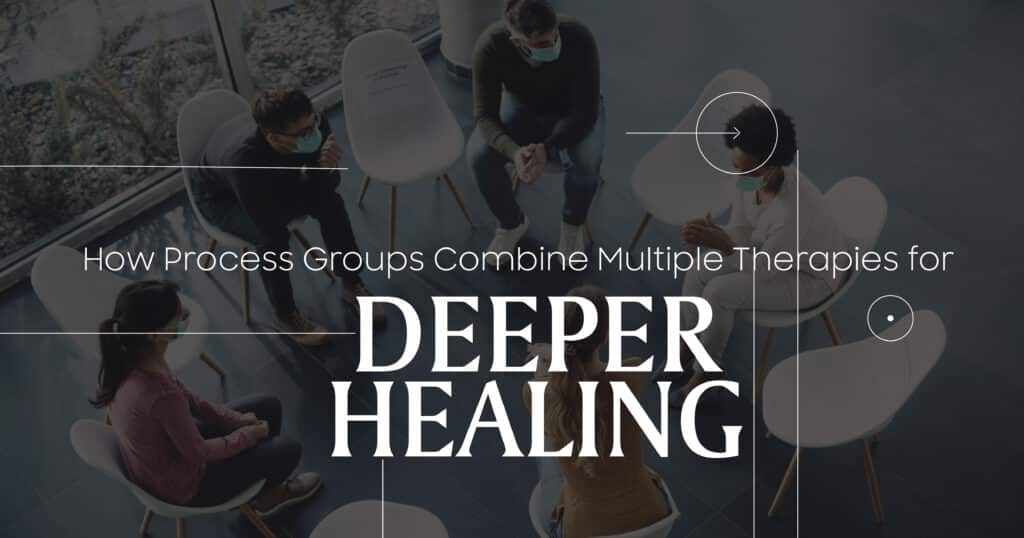In the realm of mental health treatment, process group therapy stands out as a powerful tool for fostering deeper healing and personal growth. By integrating various therapeutic approaches within a supportive group setting, process groups offer individuals a unique opportunity to explore and address underlying issues in a collaborative and transformative environment. In this insightful guide, we’ll delve into the concept of process group therapy, its components, and how it combines multiple therapies to facilitate profound healing experiences.
Understanding Process Group Therapy
Process group therapy is a form of group psychotherapy where individuals come together to share their experiences, emotions, and struggles in a supportive and confidential setting. Led by a trained therapist, process groups provide a safe space for participants to explore their thoughts and feelings, gain insight into their behaviors, and develop coping strategies to manage life’s challenges.
The Components of Process Group Therapy
- Supportive Environment: Process groups cultivate a supportive and non-judgmental atmosphere where participants feel comfortable sharing their innermost thoughts and emotions. Trust and confidentiality are paramount, allowing individuals to open up and connect with others in a meaningful way.
- Group Dynamics: The dynamics of the group play a crucial role in process group therapy, as interactions between members provide valuable insights and reflections. Through active listening, empathy, and feedback, participants can gain new perspectives and learn from each other’s experiences.
- Therapeutic Techniques: Process groups may incorporate various therapeutic techniques, including cognitive-behavioral therapy (CBT), dialectical behavior therapy (DBT), psychodynamic therapy, and mindfulness-based interventions. These techniques help participants explore underlying patterns, challenge negative thought patterns, and develop healthier coping mechanisms.
- Experiential Exercises: To facilitate deeper exploration and emotional processing, process groups may include experiential exercises such as role-playing, guided imagery, art therapy, or mindfulness practices. These hands-on activities encourage participants to engage with their emotions and experiences in a creative and experiential way.
The Integration of Multiple Therapies in Process Groups
- Cognitive-Behavioral Therapy (CBT): CBT techniques are often integrated into process groups to help participants identify and challenge maladaptive thought patterns and behaviors. By recognizing and reframing negative beliefs, individuals can develop more adaptive coping strategies and improve their overall well-being.
- Dialectical Behavior Therapy (DBT): DBT principles, such as mindfulness, distress tolerance, emotion regulation, and interpersonal effectiveness, are valuable additions to process groups, particularly for individuals struggling with emotional dysregulation, impulsivity, and relationship issues.
- Psychodynamic Therapy: Psychodynamic techniques, such as exploring unconscious conflicts, childhood experiences, and relational dynamics, can deepen the therapeutic work in process groups by uncovering underlying patterns and unresolved issues contributing to current difficulties.
- Mindfulness-Based Interventions: Mindfulness practices, such as meditation, deep breathing, and body awareness exercises, are often incorporated into process groups to help participants cultivate present-moment awareness, reduce stress, and enhance self-compassion.
Benefits of Process Group Therapy
- Social Support: Process groups provide a sense of belonging and community, fostering connections with others who share similar struggles and experiences. This social support can reduce feelings of isolation and loneliness, promoting emotional healing and resilience.
- Interpersonal Growth: Through interactions with group members, individuals can improve their communication skills, develop empathy and understanding, and learn to navigate interpersonal relationships more effectively.
- Emotional Expression: Process groups offer a safe space for participants to express and explore their emotions in a supportive and validating environment. By processing difficult feelings and experiences, individuals can gain insight and find healing.
- Personal Empowerment: Engaging in the therapeutic process within a group setting empowers individuals to take ownership of their healing journey, build self-awareness, and make positive changes in their lives.
Conclusion:
Process group therapy represents a dynamic and integrative approach to mental health treatment, combining various therapeutic modalities within a supportive group context. By fostering connections, promoting self-exploration, and providing opportunities for growth, process groups offer individuals a pathway to deeper healing and personal transformation. Whether you’re seeking support for specific issues or striving for personal growth, process group therapy can be a valuable resource on your journey to wellness.





